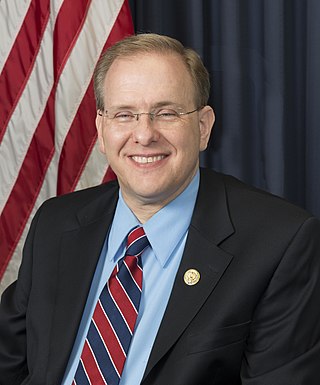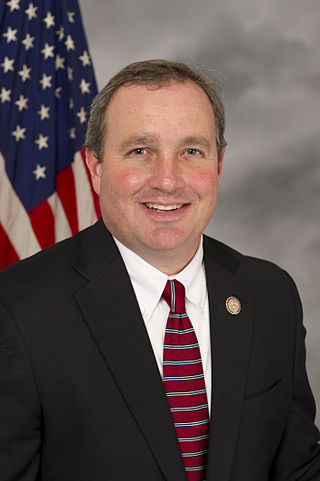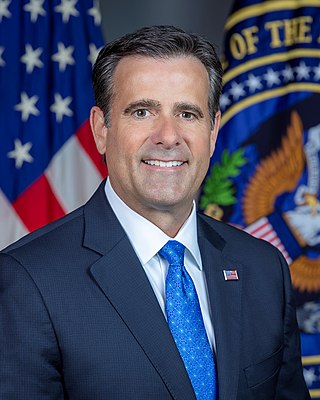
James R. Langevin is an American politician who served as the U.S. representative for Rhode Island's 2nd congressional district from 2001 to 2023. A member of the Democratic Party, he is the first quadriplegic to serve in Congress; Langevin was appointed to be the first quadriplegic speaker pro tempore of the U.S. House of Representatives in 2019. Langevin did not seek reelection in 2022.

The Homeland Security Act (HSA) of 2002, was introduced in the aftermath of the September 11 attacks and subsequent mailings of anthrax spores. The HSA was cosponsored by 118 members of Congress. The act passed the U.S. Senate by a vote of 90–9, with one Senator not voting. It was signed into law by President George W. Bush in November 2002.

Yvette Diane Clarke is an American politician serving as the U.S. representative for New York's 9th congressional district since 2013. A member of the Democratic Party, she first entered Congress in 2007, representing New York's 11th congressional district until redistricting. Clarke represented the 40th district in Brooklyn on the New York City Council from 2002 to 2006.

The 114th United States Congress was a meeting of the legislative branch of the United States of America federal government, composed of the United States Senate and the United States House of Representatives. It met in Washington, D.C., from January 3, 2015, to January 3, 2017, during the final two years of Barack Obama's presidency. The seats in the House were apportioned based on the 2010 United States census.

Patrick Leo Meehan is a former American Republican Party politician and federal prosecutor from Pennsylvania who represented parts of Delaware, Chester, Montgomery, Berks, and Lancaster counties in the United States House of Representatives from 2011 until his resignation in 2018. He succeeded Democrat Joe Sestak, who ran unsuccessfully for the United States Senate.

Derek Christian Kilmer is an American politician who has been the U.S. representative for Washington's 6th congressional district since 2013. A member of the Democratic Party, he served as a member of the Washington House of Representatives from 2005 to 2007 and the Washington State Senate from 2007 to 2012, representing the 26th district.

Kevin Wayne Yoder is an American lawyer and politician who served as a member of the United States House of Representatives for Kansas's 3rd congressional district from 2011 to 2019. A Republican, Yoder was the Kansas State Representative for the 20th district from 2003 to 2011. In his 2018 reelection bid, he was defeated by Democrat Sharice Davids by a nine percent margin.

Jeffrey Darren Duncan is an American politician who has been the United States representative for South Carolina's 3rd congressional district since 2011. A Republican, Duncan previously served as a member of the South Carolina House of Representatives.
National Urban Security Technology Laboratory is a United States government-owned, government-operated laboratory, part of the Department of Homeland Security (DHS) Science & Technology Directorate. It is located in the Federal Office Building at 201 Varick Street in the Hudson Square neighborhood, Manhattan, New York.

The Networking and Information Technology Research and Development (NITRD) program consists of a group of U.S. federal agencies to research and develop information technology (IT) capabilities to empower Federal missions; support U.S. science, engineering, and technology leadership; and bolster U.S. economic competitiveness.

The Cyber Intelligence Sharing and Protection Act was a proposed law in the United States which would allow for the sharing of Internet traffic information between the U.S. government and technology and manufacturing companies. The stated aim of the bill is to help the U.S. government investigate cyber threats and ensure the security of networks against cyberattacks.

United States–Israel Strategic Partnership Act of 2014 are almost identical bills introduced to the 113th United States Congress.

The National Cybersecurity and Critical Infrastructure Protection Act of 2013 is a bill that would amend the Homeland Security Act of 2002 to require the Secretary of the Department of Homeland Security (DHS) to conduct cybersecurity activities on behalf of the federal government and would codify the role of DHS in preventing and responding to cybersecurity incidents involving the Information Technology (IT) systems of federal civilian agencies and critical infrastructure in the United States.

John Lee Ratcliffe is an American politician and attorney who served as the Director of National Intelligence from 2020 to 2021. He previously served as the U.S. representative for Texas's 4th district from 2015 to 2020. During his time in Congress, Ratcliffe was regarded as one of the most conservative members. Ratcliffe also served as Mayor of Heath, Texas, from 2004 to 2012 and as acting United States Attorney for the Eastern District of Texas from May 2007 to April 2008.

The Chemical Facility Anti-Terrorism Standards Program Authorization and Accountability Act of 2014 is a bill that would make permanent the United States Department of Homeland Security’s (DHS’s) authority to regulate security at certain chemical facilities in the United States. Under the Chemical Facility Anti-Terrorism Standards (CFATS) program, DHS collects and reviews information from chemical facilities in the United States to determine which facilities present security risks and then requires them to write and enact security plans.

The Cybersecurity Information Sharing Act is a United States federal law designed to "improve cybersecurity in the United States through enhanced sharing of information about cybersecurity threats, and for other purposes". The law allows the sharing of Internet traffic information between the U.S. government and technology and manufacturing companies. The bill was introduced in the U.S. Senate on July 10, 2014, and passed in the Senate October 27, 2015. Opponents question CISA's value, believing it will move responsibility from private businesses to the government, thereby increasing vulnerability of personal private information, as well as dispersing personal private information across seven government agencies, including the NSA and local police.

The Homeland Security Cybersecurity Boots-on-the-Ground Act is a bill that would require the United States Department of Homeland Security (DHS) to undertake several actions designed to improve the readiness and capacity of DHS’s cybersecurity workforce. DHS would also be required to create a strategy for recruiting and training additional cybersecurity employees.

The Alliance for Biosecurity is a consortium of companies that develop products to respond to national security threats, including bioterrorism pathogens and emerging infectious diseases. It is headquartered in Washington DC.

The Strengthening State and Local Cyber Crime Fighting Act of 2017 is a bill introduced in the United States House of Representatives by U.S. Representative John Ratcliffe (R-Texas). The bill would amend the Homeland Security Act of 2002 to authorize the National Computer Forensics Institute, with the intent of providing local and state officials with resources to better handle cybercrime threats. Ratcliffe serves as the current chairman of the House Homeland Security Subcommittee on Cybersecurity and Infrastructure Protection.

The Promoting Resilience and Efficiency in Preparing for Attacks and Responding to Emergencies Act, or PREPARE Act, of 2017 is a bill introduced in the United States House of Representatives by U.S. Representative Dan Donovan. The bill would assist American attempts to protect the nation from potential terror attacks and fortify emergency response capabilities through reauthorizing grants for programs that are necessary for disaster relief.











